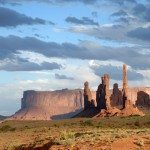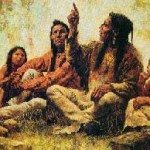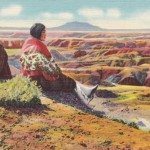TUCSON – At dawn there is the scent of coffee and pinto beans, the sound of Spanish language television and the dampness of the swamp cooler in the Sonoran Desert heat. Outside, a relative sleeps in the cool beneath the trees.
When Jose Matus, Yaqui ceremonial leader and border rights activist arrives, there is laughter. Matus will escort Yaquis to the border of Mexico as they return to their villages. It is a journey Matus has taken many times, dueling border guards and immigration officials to ensure the right of passage of Indigenous peoples.
The adobe house in Southeast Tucson is the home of Maria Garcia, spokeswoman for the tribes in Sonora, Mexico and her husband, Joe Garcia, the lieutenant governor of the O’odham in Mexico.
Parked outside are aging vans which the Garcias drive on their constant trips to the villages of Mexico. A chain remains on the orange van. It was towed back the border. Another, a beige van, was towed through a flash flood, the result of sudden rains in the desert.
“We just have to member why we do it. It is for the people,” says Maria Garcia as she laughs with the others. Maria, Tarasca Indian from Mexico, cooks enchiladas and pinto beans for Yaqui, O’odham and community activists.
It is mid-August and Indigenous peoples from Mexico and the United States are gathered at San Xavier, on Tohono O’odham tribal land south of Tucson, to form an alliance to protect the human rights and civil rights of Indigenous peoples crossing the international border.
The Alianza Indigena Sin Fronteras (Indigenous Alliance Without Borders) was formed to defend the right of passage on ancestral lands of Indigenous peoples.
Matus said Indigenous peoples in Mexico, primarily subsistent farmers with few means, can not meet the requirements of the U.S. Immigration and Naturalization Service to cross the border.
“Indigenous people in Mexico don’t have electric and gas bill receipts. They don’t have money in the bank,” said Matus, director of Coalicion De Derechos Humanos/Arizona Border Rights Project in Tucson.
Yaqui, O’odham, Cocopah and Kickapoo cross the international border from California to Texas to visit family members and attend ceremonies. The Yaqui, O’odham and Cocopah have lived here, in the Sonoran Desert, since time immemorial.
“We feel we are one family. We have no borders,” said Fidelia Suarez, Yaqui from the village of Bacum, Mexico, representing the Traditional Council of Indigenous Nations in the northwest state of Sonora.
Joe Garcia said increased harassment and intimidation at the border comes at a time when O’odham are losing their ancestral lands in Mexico due to encroachment and land fraud by non-Indians. With the recent privatization of land in Mexico, O’odham risk losing their homelands. During late summer, wells are dry and cattle starve on the barren land.
“They have to work the fields to buy water,” Maria Garcia said.
Since the Tohono O’odham Nation in Sells, Ariz., closed the O’odham in Mexico office in September, O’odham in Mexico are without aid and services, Lt. Gov. Garcia said.
During the gathering to form the border rights alliance Aug. 16 and 17, Isabel Garcia, director, Pima Country Legal Defender, said the border has become a war zone for people of color.
“The border zone is everywhere there is brown sinned people. We are all suffering human rights and civil rights violations,” Isabel Garcia said.
“Everyone with brown skin is being asked to produce documentation. There is no justice for people of color.”
Isabel Garcia said the abuses range from verbal to being shot in the back by border guards.
Armed with a video camera, Martiza J. Broce is on patrol. Leading the Migra Patrol in Tucson, she follows the border patrol and police to document their treatment of persons detained and deported.
Neither the border patrol nor local police are happy about being monitored.
“They hate it,” said Broce, the community coordinator with Coalicion De Derechos Humanos/Arizona Border Rights Project.
“They are going into church soup kitchens and schools, which is against the law. These are supposed to be sanctuaries, safe zones.” Broce said during this time of anti-immigrant sentiments, the border patrol violates detainees’ rights to call an attorney, call family members and remain silent.
Joining Indigenous peoples at the gathering were activists from across the Southwest, including the Tusconians for a Clean Environment and the Southwest Network for Environmental and Economic Justice.
Ill with cancer and opposing uranium mining, Laguna Pueblo, N.M. elder Dorothy Purley listened to reports of harassment and abuse along the border.
“It is not fair because the land actually belongs to us,” Purley said.
The Alianza Indigena Sin Fronteras was formed to protect human and civil rights along the international border. Research into the effects of NAFTA, a study of bi-national registry and the possibility of a constitutional amendment to ensure the rights of mobility are proposed.
Mike Flores, Tohono O’odham, joins Matus and the Garcias in the struggle for Indigenous rights in Mexico. They were all members of an Indigenous delegation to Chiapas to support Mayan human rights and oppose military oppression in 1995. The group pays for their efforts with personal funds and occasional fund-raiser dinners at Maria’s restaurant La Indita in Tucson.
Flores said Indigenous peoples have the right to determine their own destiny.
“This is where the Creator placed us in this hemisphere. We were given the knowledge and wisdom of how to live off the Sonoran Desert,” Flores said.
We need to continue our ceremonies for the good of humankind.”







